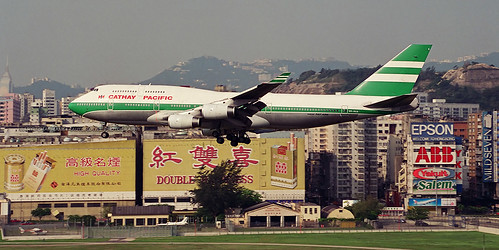Greetings from sunny San Po Kong!
We moved flats last weekend, so after 25 years living in and around Kennedy Town on Hong Kong island, it's time to get to know Kowloon better. The new flat looks out over the old Kai Tak Airport site, so let me show you the view, and a few points of interest.
Looking northeast
That photo looks northeast along Prince Edward Road East, with old Kai Tak on its right. Despite all the construction underway on the airport site, traces of its history remain. The road I've marked (A) above is an example - it's named Concorde Road.
Looking south
This view looking south towards Hong Kong island gives the best idea of the size of the site. It's mostly just an expanse of flat ground, but the old runway (B) is still clear to see. There is a better selection of landmarks if we turn further to the right.
Looking southwest
(C) is the first in this view, a small cluster of buildings that includes a curved Nissen-type hut, and what looks a small aircraft hangar. The modern map marks them as "HK Aviation Club". You can see them more clearly at the bottom-right of this 1996 view:
(D) isn't a specific building, but marks the height limit that applied when the airport was in use. The taller buildings date from after the airport closed in 1998, showing how much development there has been over the last 20 years.
(E) is the old airport hotel. It has been renamed the Regal Oriental Hotel, but it's still the same building. There used to be a footbridge connecting it to the airport's terminal building on the left of the highway, so it was a handy place to pass the time if you got to the airport early. The footbridge has been removed, but a couple of road ramps that connected the right carriageway of the highway to the airport still remain.
(F) marks where the Kai Tak Nullah disappears underground, before reappearing in a channel that ran across the apron and emptied out into the strip of water between the runway and the mainland. That water used to stink - when you flew into Kai Tak the smell of the nullah was a sure sign you'd landed. So it's been a pleasant surprise to find how much the nullah has changed.
When we first came to look at flats here, I got a glimpse of the middle section of the nullah from the top deck of the bus we were on, and noticed some white birds there.
I assumed the birds were fake, installed to make the area look a bit prettier. But when we walked over for a closer look, one of the "fake" birds got up and flew away!
The water still has a bit of a whiff about it, but is much better than before. It is certainly clean enough to have shoals of large fish in it, which explain the presence of the birds.
The project to improve the old nullah includes some re-branding (modern maps call it the Kai Tak River instead of Nullah), and a website. The Kai Tak River website's history page is worth a visit to see how the watercourse has changed its route over the years, and to learn how they keep it flowing during the dry season - spoiler: it involves sewage from Shatin!
(G) is the oldest item to note, and pre-dates the airport. The original shoreline ran near to the left carriageway of the modern highway, and overlooked a shallow bay. Kowloon City was on the right of the carriageway, so there was a steady traffic of boats visiting this area to transport goods and people. To make it easier to load and unload the boats, a long pier was built out into the bay, first from wood and then later from stone. It was known as the Lung Tsun Pier, or the Kowloon City Public Pier.
The pier was buried when the bay was reclaimed, but its remains were re-discovered after the airport was closed. The site of those remains is shown by the green rectangle of vegetation marked (G).
Those are some of the things I've noticed in the first week living here. What else should I look out for around this area?
Further reading:
Gwulo book update: I saw the proofs from the printer on Thursday. They look very good, but we decided to make final tweaks to three of the photos. I'll receive the updated proofs to sign off on Tuesday, then the printer can start work. I'm hoping to receive the printed books in early December. New on Gwulo...
If you can leave a comment with any more information about these, it will be gratefully received.
Some of the new photos added: Contributor schultie is uploading a very interesting set of family photos from the 1920s. Here are a few - click on one and use the "Navigate gallery" to see the others.
Other new photos:
Click to see all recently added photos. |

















